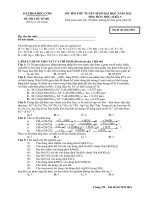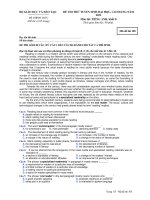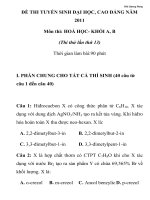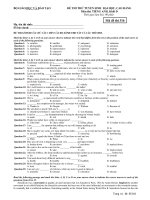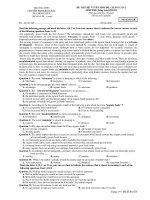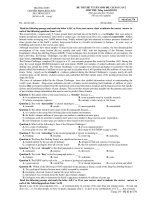Đề thi thử tuyển sinh vào lớp 10 môn Tiếng Anh
Bạn đang xem bản rút gọn của tài liệu. Xem và tải ngay bản đầy đủ của tài liệu tại đây (104.88 KB, 3 trang )
PART 1: READING
I. Choose the word (A, B, C or D) that best fits the blank space in the following passage
When I first started learning English ten years ago, I could hardly (1)_________a word - "hello",
"good bye", "thank you" was just about it! I went to classes two evenings a week and I was surprised at how
quickly I (2)_________ progress.(3)__________ the course we learned lots of vocabulary and studied grammar
rules.(4)____________thing I enjoyed most was being able to practise speaking with the other students in my
class.
After two years I went to England to a (5)______ school. It was in Cambridge.I did a(6)________
course at a very good school and I stayed with a local family. It was a fantastic experience and I (7)_______ up
a lot of things from speaking with my host family and with other students from (8)_________ the world. I
really improved my pronunciation as well. When I got back (9)___________ my home town, I was so much
more confident. I(10) actually hold a conversation with my teacher in English.
1. A. talk
B.speak
C.say
D.tell.
2. A. do
B.make
C.did
D.made
3. A. During
B.After
C.Before
D. While
4. A. That
B.A
C.The
D.Those
5. A. science
B.language
C.art
D.finance
6. A. three-weeks B.third-week
C.threes-week
D.three-week
7. A.picked
B.looked
C. got
D.stood
8. A.all
B.over
C.over all
D.all over
9. A.the
B.to
C.in
D.on
10. A.had to
B.used to
C.could
D.would
II. Read the following passage and mark the letter A, B, C, or D on your answer sheet to indicate the correct
answer to each of the questions
Every year, students in many countries learn English. Some of these students are young, children.
Others are teenagers. Many are adults. Some learn at school, others study by themselves. A few learn English
just by hearing the language in films, on television, in the office or among their friends. But not many are lucky
enough to do that. Most people must work hard to learn another language.
Many boys and girls learn English at school because it is one of their subjects. They study their own
language, mathematics, and English. In England, America, or Australia, many boys and girls study their native
language, which is English, mathematics, and another language, perhaps French, or German or Spanish.
Many adults learn English because it is useful for their work. Teenagers often learn English for their
higher studies, because some of their books are in English at college or university. Others learn English because
they want to read newspapers or magazines in English.
1. According to the writer______________
A.only adults learn English
C.no children like to learn English
C.English is useful only for teenagers
D. English is popular all over the world
2. Most people learn English by_________
A.watching videos only
B. working hard on their lessons
C.hearing the language in the office
D.talking with foreigners
3.Many boys and girls learn English because___________
A.it is included in their study courses
C.they are forced to learn it
B.English can give them a job
D.they have to study their own language
4. In America or Australia many school children study__________.
A.English as a foreign language
B.English and mathematics only
C.such foreign languages as French, German, and Spanish
D.their own language and no foreign language
5. Marry adults learn English because_______________
A. English is spoken in their office
B. they want to go abroad
C. most of their books are in English
D. it helps them in their work
III. Read the following passage and mark the letter A, B, C, or D to indicate the correct answer to each of
the questions that follow.
Traditionally, women were considered to be full-time homemakers. Their responsibilities were to take
care of their children and family. They didn't have any role in the household earning. Over the years, the roles
of women have changed. Women now have a voice, unlike before. Families are no more male-dominated. Like
men, women also make major life decisions. Women have stood against dowry and domestic violence. Even in
the workplace, they fight against sexual abuse and inequality. Child marriage is being stopped in many
communities. Men now play a role in child raising and household activities just like women. Both men and
women now share their responsibilities both home and outside. Women now stand against any discrimination
and torture. There have been lots of gender- issue related movements and many social organizations now fight
for women's rights. Women are now getting power even in rural areas. In many countries now women are the
head of the state. Education has made women independent and they are no longer dependent on men to lead
their lives.
Business laws have changed to allow more women in the workplace and giving them a comfortable
environment to work in. Women can now stand tall like men and get equal opportunities in everything.
Question 28: What is the most likely to be the title of the passage?
A. Women's roles at home and outside
B. Women and housework
C. New laws supporting women in workplace.
D. Fighting for women's rights.
Question 29: According to paragraph 2, what do women NOT do to gain their rights?
A. Preventing domestic violence
B. Standing against feeling of people
C.Launching movement for women's rights
D. Fighting against sexual abuse
Question 30: What is the author's purpose when mentioning men's role in child raising in paragraph 3?
A. Emphasize men's role in the family.
B To give a proof of gender equality in the family.
C. To show that men can do it better than women.
D. To state that men can do raise a child without help.
Question 31: What does the word "lead"in paragraph 3 mostly mean?
A. Have a particular type of life
C. Direct the independent movement
B. Be a female leader in life
D. have full power in business
Question 32: Which of the following is one of the impacts of business law changes?
A. Encourage women to create more job opportunities.
B. Allowing equal number of men and women in the workplace.
C. Making a comfortable environment for women
D. Attracting women of the same height as men.
PART 2: WRITING
I. Mark the letter A, B, C, or D to indicate the part that is incorrect.
1. Last summer, I went to the Phu Wuoc Island with my family
2. There are much students in the schoolyard
3. If I try my best, I would pass this exam
4. By the time we had had lunch, he arrived home
5. Can you go to the convenience store and buy me a tin of rice?
I. Mark the letter A, B, C, or D on your answer sheet to indicate the sentence that is closest in meaning to
each of the following questions.
1. She had come to the cinema before I did my homework.
A. By the time she had come to the cinema before I did my homework
B. After she had come to the cinema before I did my homework
C. When she had come to the cinema before I did my homework
D. As soon as she had come to the cinema before I did my homework
2. We started learning English 7 years ago.
A.We have learnt English for 7 years.
B. We didn't learn English 7 years ago.
C. We haven't learnt English for 7 years.
D. This is the first time we have learnt English after 7 years.
3.Students will have to make their own learning decisions. This will be hard for many of them.
A. Students will have to make their own learning decisions, where will be hard for many of them
B. Students will have to make their own learning decisions, when will be hard for many of them
C. Students will have to make their own learning decisions, which will be hard for many of them
D. Students will have to make their own learning decisions, that will be hard for many of them
4. I want to meet Nga, but I don't have her address.
A. If I have Nga's address, I meet her
B. If I have Nga's address, I would meet her. meet her.
C. If I had Nga's address, I will meet her.
C. If I had Nga's address, I would meet her.
5. Unless we protect the environment, our life will be badly affected.
A. If our life is badly affected, we will protect the environment.
B. If we protect the environment, our life will be badly affected.
C. If we don't protect the environment, our life will be badly affected.
D. If we don't protect the environment, our life won't be badly affected.
III. Write a paragraph (80-100 words) your friend's eating habit
